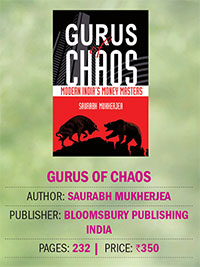 Saurabh Mukherjea’s Gurus of Chaos is yet another addition to the books that preaches long-term investing. However, the book remains just that. The sum and substance fails to live up to its hype and is just a me-too in an already crowded shelf space. While the author does not offer any new big idea, a lot of the advice is mere repetition. They are mostly ideas any serious investor would have read before. In fact, I feel one would be better off reading Benjamin Graham, Peter Lynch or Anthony Bolton for a more in-depth analysis of value investing and its tenets.
Saurabh Mukherjea’s Gurus of Chaos is yet another addition to the books that preaches long-term investing. However, the book remains just that. The sum and substance fails to live up to its hype and is just a me-too in an already crowded shelf space. While the author does not offer any new big idea, a lot of the advice is mere repetition. They are mostly ideas any serious investor would have read before. In fact, I feel one would be better off reading Benjamin Graham, Peter Lynch or Anthony Bolton for a more in-depth analysis of value investing and its tenets.
Having said that, India is a very complex financial market. The average investor will find it extremely useful to refer to the nuggets of wisdom this book offers from professionals to develop an investing approach tailored to the Indian market. There are enough rules here to help an inexperienced investor navigate the pitfalls of investing.
The key highlights of the book are the interviews with some high-quality investors and fund managers. Their wisdom, story and evolution are enlightening and inspiring. The author clearly has access to some of the best brains in the industry.
In the book, Alroy traces the history of Indian brokerages over the last two decades and how his own investment philosophy has evolved over time to a very specific process. Akash talks about meaningful positions way back in the 90s and how those shaped his thinking. Also, Sanjay Bhattacharyya’s ideas on when to exit a stock is a must-read.
The author stresses on the Indian context, which resonates well with the Indian reader, who is usually brought up on value investing books that talk about foreign companies and concepts. He shares his understanding of Indian corporates and their mindset in a lucid manner. He has explained various value investing concepts through companies such as Asian Paints and TTK Prestige in a refreshing manner.
The section on being a contrarian serves as a useful guide and the author’s advice on how to pick a company and to be a contrarian is valuable. Some other interesting learnings from the book include 10,000 hours of practice concept for investment professionals (referred from another book) and how valuation is one part of the entire game and how it’s important to understand business cycle, opportunity, management etc.
To its credit, it is an easy-to-read book with a simple narrative, useful information and advice. At times, his advice borders on plain common sense, which an amateur might like. For the more advanced investor, there is little to take home. The book could have achieved a lot more given the author’s vast experience and access. One would have liked more in-depth interviews and more innovative advice, which is missing. What could have been a three-course meal ends up being a bland starter with a little bit of seasoning sprinkled on top.











